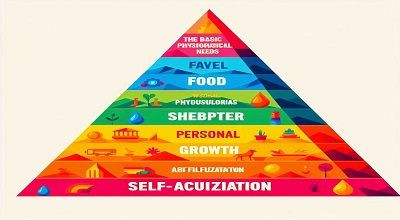Maslow’s Hierarchy Of Needs
Abraham Maslow’s Hierarchy of Needs is a psychological theory that describes the five-tiered pyramid of human needs, arranged in a hierarchical order. Maslow proposed this theory in his 1943 paper “A Theory of Human Motivation” and later expanded on it in his 1954 book “Motivation and Personality.”. The hierarchy is often depicted as a pyramid, with the lower levels representing basic needs. The upper levels represent higher-order needs.
The five levels of Maslow’s Hierarchy of Needs, from the most basic to the highest, are as follows:
- Physiological Needs: These are the most fundamental needs necessary for survival, such as air, water, food, sleep, and shelter. Without satisfying these basic physiological needs, an individual’s survival is at risk.
- Safety Needs: Once physiological needs are met, individuals seek safety and security. This includes physical safety (protection from harm), financial security, health, and well-being.
- Love and Belongingness Needs: After achieving safety, people look for social connections and a sense of belonging. This involves relationships, friendship, intimacy, and being part of a community or family.
- Esteem Needs: Once social needs are satisfied, individuals seek self-esteem and the esteem of others. This includes feelings of accomplishment, recognition, respect, and a sense of competence.
- Self-Actualization Needs: At the top of the pyramid is self-actualization, representing the realization of one’s full potential and personal growth. This involves pursuing personal goals, realizing creativity, and achieving a sense of purpose.
Final Words
Maslow’s theory suggests that individuals move through these levels in a sequential order. However, it’s important to note that not everyone follows the same path, and there may be deviations based on individual circumstances and cultural influences. Additionally, Maslow later introduced a sixth level, “self-transcendence,” which goes beyond personal fulfillment to focus on altruism and the well-being of others.
